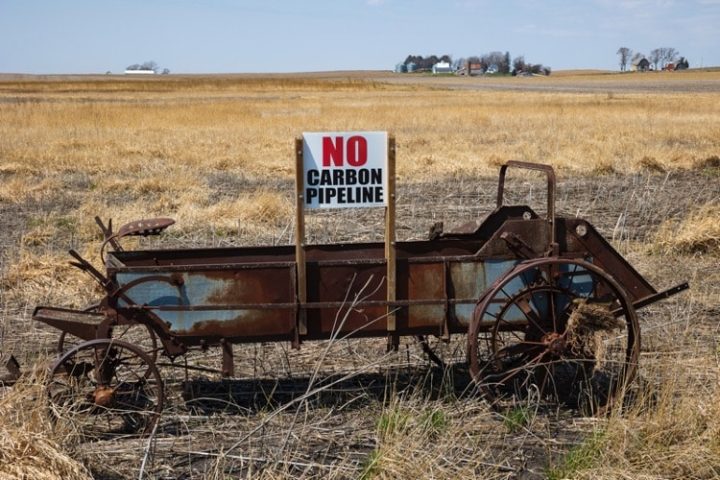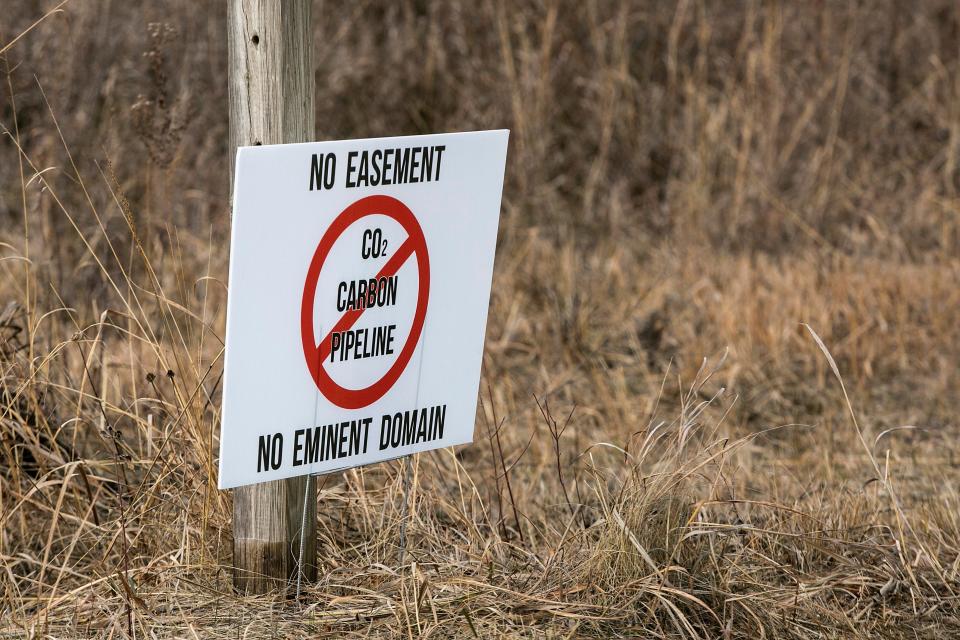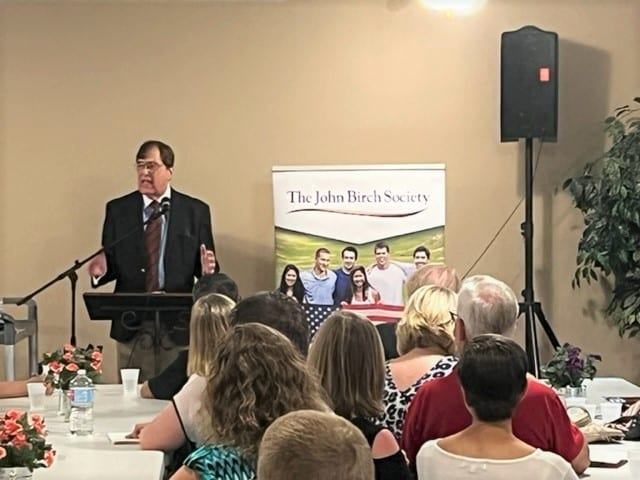
Will Iowans be able to stop private companies from digging up their fertile, grade-A, Midwestern farmland and running hundreds of miles of carbon-capture pipelines under it?
Private pipeline companies are collecting voluntary easement agreements from landowners, but have threatened to apply for eminent domain for those stubborn enough to resist.
Indeed many Iowans are resisting, and at least one activist who’s devoted his life to stopping deceptive pro-environment schemes believes it’s very possible to stop the pipelines and keep the excavators from hitting the dirt.
“I believe we can win,” Tom DeWeese, a property-rights expert, told The New American July 26. The key is for citizens to join hands across the counties and say “no,” he added.
DeWeese spent a week in July traveling across Iowa and giving presentations to help people understand the true source of this threat, the deep-rooted deceptions fueling this project, and how to create effective resistance. Later in this article, we’ll look at the practical steps DeWeese advised Iowans to take to stop the pipelines and create a blueprint to restore more liberty in their communities in general.
“There is so much opposition to this pipeline,” John Birch Society Midwest Regional Coordinator Tammy Kobza told The New American in an email (TNA is an affiliate of the JBS). Kobza, whose Iowa JBS chapters are coordinating with DeWeese to educate citizens and help stop the pipeline, has attended multiple meetings of hundreds of concerned people. “Earlier this year, I went to a meeting in LeMars, Iowa,” Kobza said. “Not one person there was in favor of it.” Kobza said she also attended a meeting of about 450 people — only one person who spoke out was in favor of it, “and he was the manager of the Ethanol plant.” Throughout Iowa, a big corn producer, signs saying “No Easement, No Eminent Domain” can be found staked into the ground.

Though touted as safe, opponents aren’t buying it. A CO2 pipeline running through Satartia, Mississippi, ruptured two years ago. Dozens of people got sick, with some still suffering problems. Despite its environmentally friendly façade, even self-described environmentalists seem to think the idea lousy. “Carbon pipelines are dangerous. Carrying concentrated amounts of hazardous carbon dioxide gas at high pressure and high speed, any incident could be disastrous,” wrote Emma Schmit, a senior Iowa organizer with Food & Water Watch, in an op-ed in a local Iowa newspaper. The Sierra Club has also opposed the CO2 pipelines.
Another reason to resist the pipelines, opponents say, is that they would destroy Iowa farms and the farmers’ livelihoods, which would consequently worsen a national food shortage that many in the ag business are warning is coming.
The pushback, which is not recent, hasn’t flown under the radar of the media. On October 13, 2021, Iowa Public Radio published a story titled “Proposed carbon dioxide pipeline draws opposition from Iowa farmers and environmentalists alike.” On November 22, 2021, Bloomberg Law published a story titled “Biggest-Ever Carbon Capture Project Facing Midwest Opposition.” On July 7, The Guardian published a story titled “The bitter fight to stop a 2,000-mile carbon pipeline.” On July 16, the N’West Iowa Review published a story titled “Unlikely allies leading anti-pipeline fight,” the crux being the unusual agreement, at least outward, between leftist environmental groups such as the Sierra Club and the constitutionally oriented John Birch Society. “The proposed carbon-capture projects are opposed by farmers, environmentalists and other Iowans that view the pipelines as an abuse of corporate and political power,” the Review reported.
The pipeline companies have been contacting landowners to convince them to grant easements. In an email to The New American, when asked for comment on the pushback, Summit Carbon Solutions, one of the pipeline companies, said 650 landowners, or about 40 percent, have signed more than 1,100 voluntary easement agreements, “and we continue to sign up new landowners daily.” Summit also said it didn’t “threaten” eminent domain, but when asked for a copy of the letter it sent to landowners, it didn’t respond.

Those who decide to refuse the companies’ offers for easement granting may find themselves faced with an offer they can’t refuse. “Our goal is to reach voluntary agreements with all landowners along the Project route, though if we are unable to do so we may need to request the right of eminent domain from the [Utilities] Board,” says a letter from another of the pipeline companies, Navigator CO2 Venture/Heartland Greenway.
The idea of a CO2 capture pipeline is to catch carbon dioxide before it enters the atmosphere, pressurize it, liquefy it, and transport it via underground pipelines to a targeted underground location, where it will be buried and stored. The pipeline companies will install equipment at ethanol plants located in Iowa — and in other nearby states — to capture nearly pure carbon-dioxide emissions resulting from fermentation processes. According to the American Society of Mechanical Engineers, five such pipelines are in the planning or construction phases. Three of them would run through several Midwestern states, including Iowa.
The private companies behind the Midwest pipelines are Summit, Navigator, and a partnership of Wolf Carbon Solutions and Archer Daniels Midland. The companies claim the pipelines will yield agricultural, economic, and, of course, environmental benefits. Summit’s website says the pipelines will open new economic opportunities for Midwestern ethanol and agricultural industries, create jobs and generate new tax revenue for local communities, and have the capacity to capture and permanently store up to 12 million tons of CO2 every year, the equivalent of removing 2.6 million vehicles from our roads annually.
Unsustainable Climate Fallacies & Agenda 2030
A March 16, 2021, a Navigator press release announced that it was partnering with BlackRock, the largest money-management firm in the world, to develop an industrial-scale carbon-capture pipeline. As previously reported by TNA, BlackRock is a corporate member of the Council on Foreign Relations (CFR) — the public face, brain trust, and nervous system of the Deep State.
BlackRock, which more recently has become known for bullying investors into promoting woke social stances, is one of the leading corporate promoters of the CFR’s global-warming hysteria and sustainable-development schemes, also known as Agenda 2030.
Agenda 21 was introduced at the 1992 UN Earth Summit in Rio de Janeiro, Brazil, featuring 50,000 delegates, including thousands of private nongovernmental organizations, that continue to create international policies. The purported purpose of Agenda 21 was to advocate for environmentally beneficial policy. However, then-Earth Summit Chairman Maurice Strong made clear the real goal when he told delegates that “current lifestyles and consumption patterns of the affluent middle class — involving high meat intake, use of fossil fuels, appliances, air conditioning, and suburban housing are not sustainable.”
Ever since — and even before — the international oligarchic class has been feverishly working to upend every aspect of how regular people live, all under the poorly hidden pretense of protecting and preserving the environment.

DeWeese, author of the books Now Tell Me I Was Wrong and Sustainable: The War on Free Enterprise, Private Property and Individuals, said an accurate definition of sustainable development is, “The action plan to inventory and control all land, all water, all minerals, all plants, all animals, all construction, all means of production, all information, all energy, and all human beings in the world.” Inventory and control.
“Every time you hear the words ‘sustainable’ or ‘carbon footprint,’ someone is pushing for more government power,” DeWeese frequently tells his listeners.
Agenda 21 has since morphed into Agenda 2030, in large part because the JBS and activists such as DeWeese have created so much resistance to it. In a 2014 Southern Poverty Law Center report titled “Agenda 21: The UN, Sustainability and Right-Wing Conspiracy Theory,” DeWeese and the JBS are among the main targets blamed for many people believing that the nefarious intentions of Agenda 2030 are real. Nevertheless, the goal has only been delayed and repackaged, not defeated.
Sustainable development has ravaged the people of the regions that have embraced it, and it threatens to do the same in the United States. Worse, it has the backing of the U.S. government. According to Bloomberg Law, the pipeline companies will make money using Section 45Q of the federal tax code, “which provides transferable tax credits to entities for either sequestering carbon emissions or using them for qualified industrial purposes. Projects can also qualify for loans and grants from the Department of Energy while investors who participate in carbon capture projects can improve their environmental, social, and governance [ESG] ratings.”
ESG ratings are how the planners gauge countries’ compliance to the sustainable goals. As of recently, a negative correlation between ESG scores and national troubles is becoming more obvious. See the depletion of dependable energy in western Europe and skyrocketing energy costs, and the recently failed state of Sri Lanka, all of which have high ESG scores.
Sustainable development provides a ruse to further infringe on property rights and decimate the wealth of Americans. It levels stringent eco-standards on communities via soft-law implementation, an approach in which nongovernmental organizations bribe local governments with various economic benefits in exchange for compliance to their eco rules.
On their website, Summit says its pipeline project “will open new economic opportunities for the ethanol and agricultural industries that are so critical to the Midwest economy. Our carbon capture and storage project will put the ethanol produced at our 32 partner facilities on track to become a net-zero fuel by 2030. This will allow these plants to sell their product at a premium in the growing number of states and countries that have adopted low carbon fuel standards.”
Catch that? The goal is 2030, and economic rewards await those who go along. This is soft law. And it’s how Agenda 2030 has burrowed its way into communities all across the nation for many years, albeit with schemes not involving carbon-capture pipelines. Many communities have sacrificed autonomy for perceived benefits.
Despite the pipelines being constructed in the name of protecting the environment, they do no such thing. DeWeese said sustainable development is proving unsustainable and environmentally destructive, and these pipelines may be the most impressively ludicrous idea yet. “In all of my years fighting the lies and insane policies of the radical Left, this is without a doubt their dumbest plan ever,” DeWeese said during a speech in Dyersville, Iowa, on July 20. He added, “But it is also the most dangerous that we have ever faced.”
Not only do the policies violate property rights and other individual liberties, they don’t even protect the environment. “Nearly every program promoted as environmental protection is an actual threat to the environment,” DeWeese emphasizes in his speeches. Some examples include:
- The National Forest Service refuses to remove dead trees from the floor of forests, creating eight feet of kindling and causing the worst forest fires in history.
- Mining for lithium for battery-powered electric cars destroys huge areas of land that can never recover.
- Seventeen million acres of solar farms are planned for Midwest states to replace coal and gas power plants, yet the plants would only take up a few acres.
- Solar panels are made of plastic, which needs oil to be produced. They also need lots of copper for the infrastructure.
- Underneath those solar panels that run end to end, row by row for thousands of acres, is cement for infrastructure wires. Nothing grows and no animals live under them. Valuable farmland is virtually destroyed.
- 250 million acres are targeted in the Midwest states for wind power, yet wind power needs huge amounts of oil for the turbines to turn. And those blades are not degradable when they no longer work.
“How much raw material, including limestone, steel, aluminum, cobalt and nickel will it take to produce a single wind turbine?” DeWeese asks his listeners. “Picture 250 million acres of these turbines, the death of scenic views, of peaceful land, and … air. Nothing will be flying. Millions of birds, raptors, and endangered species destroyed — in the name of environmental protection.”
The liberty activist dubs climate change the greatest hoax perpetrated on humanity, of which global authoritarian control is the real goal.
“There is no evidence whatsoever to back up the claims of man-made climate change. Or that CO2 carbon from man-made emissions is a danger,” he says. Furthermore, “there is no consensus of scientists. Those who oppose the theory are simply unfunded and silenced.”
The latter sentiment has been repeated by other experts, including Dr. Steven Koonin, a physicist who worked as undersecretary for science in the Department of Energy under the Obama administration. Koonin is also the author of Unsettled: What Climate Science Tells Us, What It Doesn’t, and Why It Matters, which says that the hysteria around climate change is empirically unsupported.
Koonin, during a discussion on the popular Joe Rogan podcast, also said, bolstering DeWeese’s statement, that the supposed consensus among scientists we keep hearing about is a myth. There are many scientists who agree that climate change is not the crisis we are told it is, but most have been cowed and/or defunded into silence. Koonin said he had personally heard from many colleagues who said they agreed with him but would never admit so publicly.
Fighting Back
Most TNA readers don’t need to be sold on the dangers and fallacies of climate alarmism, or the threat Agenda 2030 poses. But it’s one thing to recognize a threat, and it’s quite another to get off the couch and stop it.
Action is where the rubber meets the road. And action is a major component of The John Birch Society’s and DeWeese’s programs. DeWeese’s organization, the American Policy Center, focuses exclusively on Agenda 2030 resistance.
In Iowa, DeWeese reminded people that no land has been taken and that they have every right to fight back and expect to keep it. He told city council members and county officials it is their duty to protect the people who elected them. He chastised the county officials who wrote the Iowa Utilities Board asking them not to grant the pipeline companies eminent domain. “Don’t plead. Stand up to it,” he said. “You were elected by the people to protect their rights. Don’t be cowards and hide behind nonelected, appointed boards.”
He advised county supervisors to form a Liberty Coalition for the Coalition Supervisor Boards and pledge to protect local property rights from eminent domain. They need to prepare a legislative plan to protect the land that has been targeted. For more details on this, watch DeWeese’s speech in Dyersville here.
In his presentations around the country, DeWeese tells citizens the way to fight back against the grander Agenda 2030 sustainable-development scheme is by building Freedom Pods.
Freedom Pods are teams within the community that begin with research to define the enemy. They first identify how and through whom Agenda 2030 is creeping into the community, then they get to work. A Freedom Pod is made up of watchers (a small group of people who attend every public meeting and record what happens), agitators (the spokesmen who present your opposition), victims (those whom the bad policies will hurt), a media team (those who will stay in touch with the media), and activists (those who’ll show up for rallies and pack city council chambers). This team should also build a grading system, which would score how well elected officials are defending liberty.
“Right in your local community — that’s where they are enforcing these policies. And that’s where they must be stopped,” said DeWeese.
The battle has just begun.
To learn more about Agenda 2030 and other ways the international oligarch class is working to subvert national sovereignty and individual liberty, visit JBS.org.




